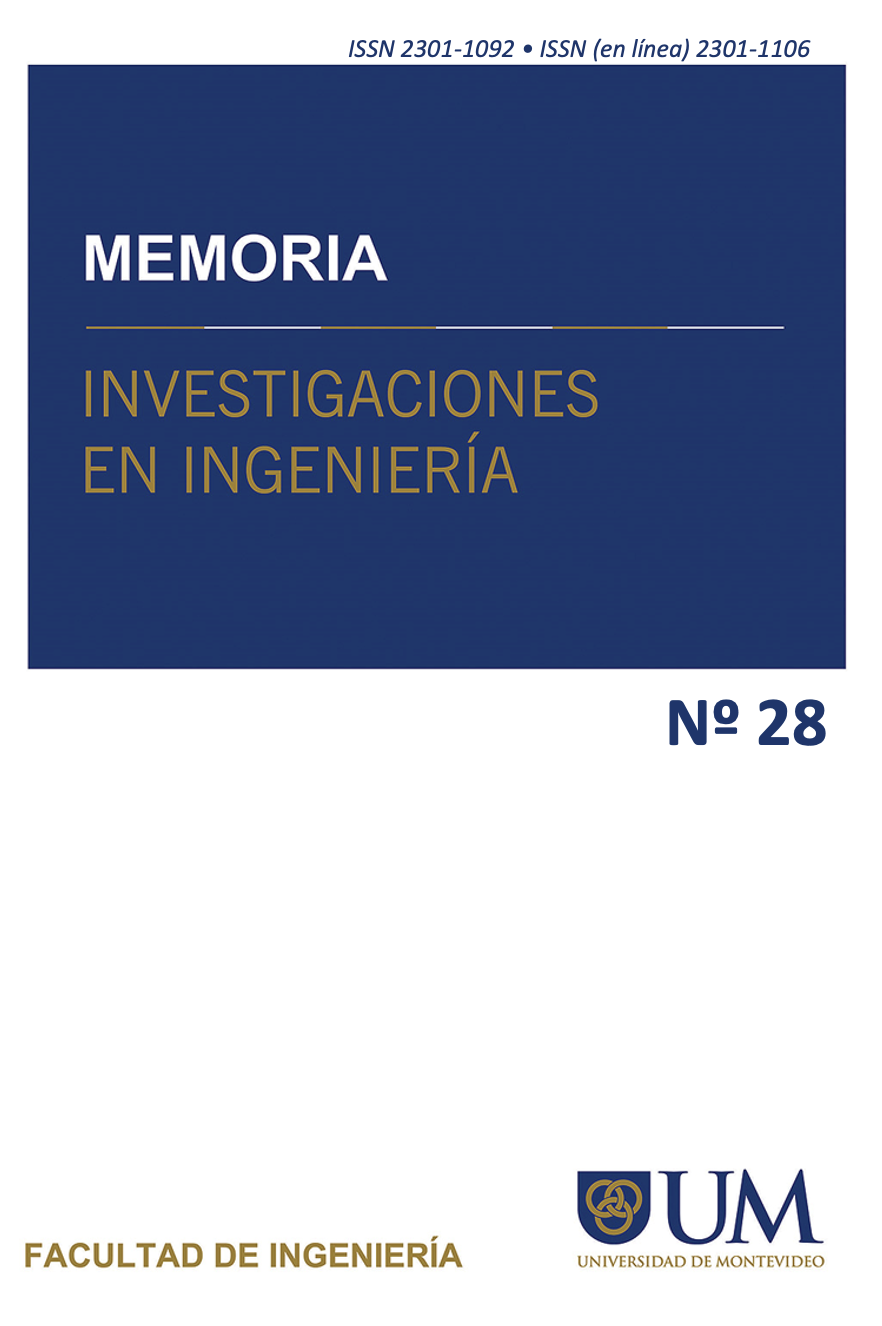Caminhos dos polímeros
uma abordagem sustentável para a disposição de resíduos plásticos
DOI:
https://doi.org/10.36561/ING.28.2Palavras-chave:
Tereftalato de polietileno (PET), Asfalto, Ligante, Estabilidade Marshall, Resíduos plásticos, Agregados, Betume, Teor ideal de liganteResumo
O Paquistão é um país repleto de recursos naturais, mas, devido ao esgotamento gradual desses recursos, o país busca se beneficiar do uso de diferentes materiais que possam atender aos propósitos pretendidos com o mínimo custo. Nosso país gera anualmente 3,3 milhões de toneladas de resíduos plásticos. O descarte de resíduos plásticos é um dos desafios mais ameaçadores para todas as principais áreas metropolitanas do mundo. Se não forem tratados imediatamente, podem se degradar no meio ambiente por muitos anos. Este estudo propõe o uso de garrafas PET na construção de estradas. O objetivo principal é analisar e comparar as propriedades de estradas com mistura de plástico e asfalto em comparação com estradas com mistura de asfalto sem plástico. Garrafas plásticas trituradas foram misturadas com asfalto em diferentes proporções (0%, 6%, 8% e 10%) para aumentar a estabilidade e a durabilidade das estradas. Diferentes testes, como estabilidade Marshall, penetração, ductilidade e amolecimento, foram realizados em laboratório. Os resultados mostraram que o asfalto com 8% de plástico apresenta baixo valor de fluidez. Além disso, o modificador plástico no asfalto aumenta a densidade da mistura, o que melhora o desempenho estrutural do pavimento asfáltico. Há um aumento no ponto de amolecimento, o que ilustra que estradas de asfalto modificado com plástico podem suportar climas quentes de forma mais eficaz do que estradas de asfalto tradicionais. Essa adição de plástico ao asfalto será uma bênção para a indústria rodoviária do Paquistão.
Downloads
Referências
A. H. Mir, ‘Use of Plastic Waste in Pavement Construction: An Example of Creative Waste management’.
O. Alabi, K. Ologbonjaye, O. Awosolu, and O. Alalade, ‘Public and Environmental Health Effects of Plastic Wastes Disposal: A Review’, J. Toxicol. Risk Assess., vol. 5, Apr. 2019, doi: https://doi.org/10.23937/2572-4061.1510021.
A. Babafemi, B. Šavija, S. Paul, and V. Anggraini, ‘Engineering Properties of Concrete with Waste Recycled Plastic: A Review’, Sustainability, vol. 10, no. 11, p. 3875, Oct. 2018, doi: 10.3390/su10113875.
V. Sahajwalla and V. Gaikwad, ‘The present and future of e-waste plastics recycling’, Curr. Opin. Green Sustain. Chem., vol. 13, pp. 102–107, Oct. 2018, doi: https://doi.org/10.1016/j.cogsc.2018.06.006.
M. Kazemi, S. Faisal Kabir, and E. H. Fini, ‘State of the art in recycling waste thermoplastics and thermosets and their applications in construction’, Resour. Conserv. Recycl., vol. 174, p. 105776, Nov. 2021, doi: https://doi.org/10.1016/j.resconrec.2021.105776.
X.-Q. Xu, S. Liao, and Y. Wang, ‘Recycling of Thermosetting Plastics’, in Recent Developments in Plastic Recycling, J. Parameswaranpillai, S. Mavinkere Rangappa, A. Gulihonnehalli Rajkumar, and S. Siengchin, Eds., in Composites Science and Technology. , Singapore: Springer, 2021, pp. 95–119. doi: https://doi.org/10.1007/978-981-16-3627-1_5.
M. E. Grigore, ‘Methods of Recycling, Properties and Applications of Recycled Thermoplastic Polymers’, Recycling, vol. 2, no. 4, Art. no. 4, Dec. 2017, doi: 10.3390/recycling2040024.
S. Nizamuddin, M. Jamal, R. Gravina, and F. Giustozzi, ‘Recycled plastic as bitumen modifier: The role of recycled linear low-density polyethylene in the modification of physical, chemical and rheological properties of bitumen’, J. Clean. Prod., vol. 266, p. 121988, Sep. 2020, doi: https://doi.org/10.1016/j.jclepro.2020.121988.
F. Welle, ‘The fats about PET (update 2018)’, 2018.
R. Nisticò, ‘Polyethylene terephthalate (PET) in the packaging industry’, Polym. Test., vol. 90, p. 106707, Oct. 2020, doi: https://doi.org/10.1016/j.polymertesting.2020.106707.
B. Mishra and M. K. Gupta, ‘Use of plastic waste in bituminous mixes by wet and dry methods’, Proc. Inst. Civ. Eng. - Munic. Eng., vol. 173, no. 2, pp. 87–97, Jun. 2020, doi: https://doi.org/10.1680/jmuen.18.00014.
A. K. Sahu and R. K. Singh, ‘Application of Waste Plastic Materials in Road Construction’, 2016.
P. N. A. Asare, F. A. Kuranchie, and E. A. Ofosu, ‘Evaluation of incorporating plastic wastes into asphalt materials for road construction in Ghana’, Cogent Environ. Sci., vol. 5, no. 1, p. 1576373, Jan. 2019, doi: https://doi.org/10.1080/23311843.2019.1576373.
M. Sasidharan, M. E. Torbaghan, and M. Burrow, ‘Using Waste Plastics in Road Construction’, May 2019, Accessed: Sep. 05, 2023. [Online]. Available: https://opendocs.ids.ac.uk/opendocs/handle/20.500.12413/14596
A. Biswas, A. Goel, and S. Potnis, ‘Performance comparison of waste plastic modified versus conventional bituminous roads in Pune city: A case study’, Case Stud. Constr. Mater., vol. 13, p. e00411, Dec. 2020, doi: https://doi.org/10.1016/j.cscm.2020.e00411.
A. Biswas and S. Potnis, ‘Plastic Bituminous Roads: A Sustainable Technology–For Better Handling Distresses’, Eur. J. Eng. Technol. Res., vol. 7, no. 1, pp. 63–69, 2022.
S. B. Abd Karim et al., ‘Plastic Roads in Asia: Current Implementations and Should It Be Considered?’, Materials, vol. 16, no. 16, Art. no. 16, Jan. 2023, doi: https://doi.org/10.3390/ma16165515.
A. M. Zaltuom, ‘A Review Study of The Effect of Air Voids on Asphalt Pavement Life’, in Proceedings of First Conference for Engineering Sciences and Technology: Vol. 2, AIJR Publisher, Nov. 2018, pp. 618–625. doi: https://doi.org/10.21467/proceedings.4.29.
M. M. Shah, J. Yousaf, U. Khalid, H. Li, J.-J. Yee, and S. A. Z. Naqvi, ‘Plastic roads: asphalt mix design and performance’, Discov. Appl. Sci., vol. 6, no. 4, p. 195, Apr. 2024, doi: https://doi.org/10.1007/s42452-024-05772-x.
‘Standard Test Method for Marshall Stability and Flow of Asphalt Mixtures’. [Online]. Available: https://www.astm.org/d6927-15.html
https://trendeconomy.com/data/h2/Pakistan/2714,".
“Petroleum Corporation limited, Pakistan”.
Publicado
Como Citar
Edição
Seção
Licença

Este trabalho está licenciado sob uma licença Creative Commons Attribution 4.0 International License.






















